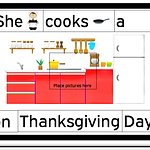Thanksgiving Sentence Strips, Questions, and Thought Starters
ID
e4e053
Description
Sentence strips, questions, and thought starters you can use with the Thanksgiving Sentence Strips resource by Sara Lowczyk.
License
Ambiki License - © Ambitious Idea Labs (AL)
Usable with 1 PDF resource

Thanksgiving Sentence Strip
Editable resource with different objects and a Thanksgiving sentence strip.
Create a free Ambiki account to view the 13 activity list items for this activity list.
Activity lists are used by SLPs, OTs, and PTs to enhance their sessions - both in-person and teletherapy. An activity list can be used in a slide-show manner in a session, in a game, and as a printable artifact to use in an in-person session.
Create a free Ambiki account to view the phonemes table for this activity list.
Create a free Ambiki account to view the blends table for this activity list.
Additional information
- Sentence list
- English
What are activity lists?
An activity list consists of activity list items which can be phonemes, blends, words, minimal pairs, phrases, sentences, and/or paragraphs.
A list can contain all of the same type of items (i.e. word list) or it could be a mix of different types of items (i.e. some words and some minimal pairs).
Activity lists are not only for speech therapists. Ambiki has many activity lists for OTs and PTs as well.
As an example, an OT might use a "Zones of Regulation" activity list to work on Emotional Regulation with a patient.
A PT might use a "Coordination Activities" list with a patient to practice Strength or Bilateral Coordination exercises.
An alternate way to think of an activity list is that it is like a manual for how to use a PDF resource. Ambiki activity lists are connected to Ambiki PDF resources. The activity list is a way to look at a resource from another perspective - to cover the resource completely from preparation to the end of the session. Each activity list item provides a way that you can elicit a response from your client.
Focus areas
- ST -> Expressive Language
- ST -> Expressive Language -> Analogies
- ST -> Expressive Language -> Attributes
- ST -> Expressive Language -> Categories
- ST -> Expressive Language -> Commenting
- ST -> Expressive Language -> Describing
- ST -> Expressive Language -> Differences
- ST -> Expressive Language -> Function
- ST -> Expressive Language -> Grammar
- ST -> Expressive Language -> Narrative Development
- ST -> Expressive Language -> Pronouns
- ST -> Expressive Language -> Similarities
- ST -> Expressive Language -> Utterance Expansion
- ST -> Pragmatics / Social Skills / Life Skills -> Following Directions
- ST -> Receptive Language
- ST -> Receptive Language -> Analogies
- ST -> Receptive Language -> Adjectives
- ST -> Receptive Language -> Answering Questions
- ST -> Receptive Language -> Associations
- ST -> Receptive Language -> Attributes
- ST -> Receptive Language -> Categories
- ST -> Receptive Language -> Differences
- ST -> Receptive Language -> Following Directions
- ST -> Receptive Language -> Inferences
- ST -> Receptive Language -> Labeling
- ST -> Receptive Language -> Nouns
- ST -> Receptive Language -> Pronouns
- ST -> Receptive Language -> Reading
- ST -> Receptive Language -> Similarities
- ST -> Receptive Language -> Vocabulary
25 more focus areas. Click arrow to view all.
Themes
Evidence based practice citations
-
Use of Narrative-Based Language Intervention With Children Who Have Specific Language Impairment
Author(s): Swanson, L., Fey, M., Millis, C. & Hood, L. -
Children With Slow Expressive Language Development - What Is the Forecast For School Achievement?
Author(s): Marilyn A Nippold & Ilsa Schwarz